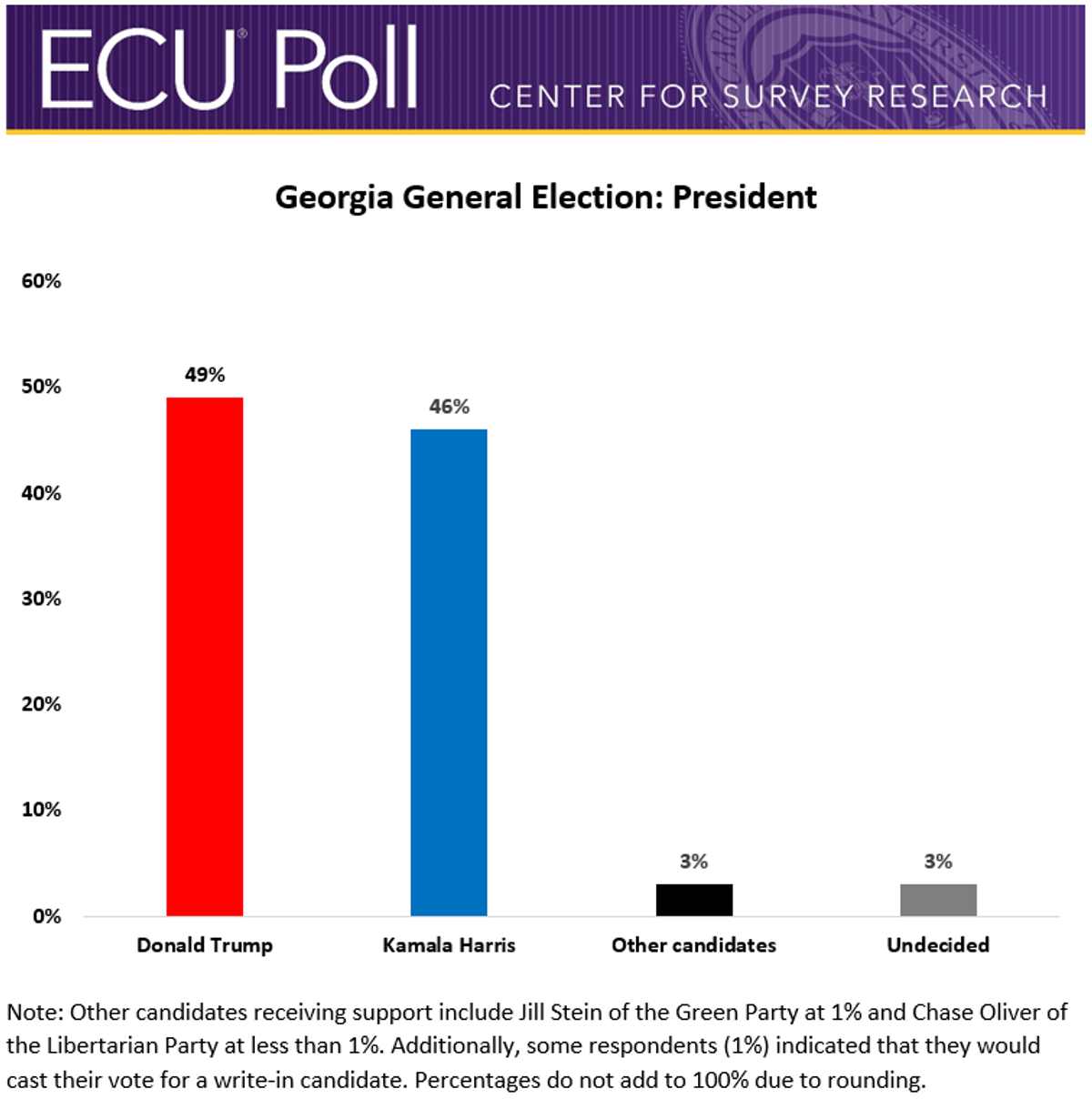The latest ECU Poll, conducted October 9 through 14, shows former President Donald Trump with a three-percentage point lead over Vice President Kamala Harris among likely voters in Georgia, 49% to 46%. (The poll’s margin of error is +/- 4%.) Only 3% remain undecided, with another 3% indicating that they plan to support an independent, minor-party, or write-in candidate.

Overall, 52% of likely voters in Georgia have a very favorable or somewhat favorable opinion of Donald Trump compared to 46% who have a very favorable or somewhat favorable opinion of Kamala Harris. Additionally, 49% of likely voters in Georgia have a very favorable or somewhat favorable opinion of Republican vice-presidential candidate J.D. Vance, while 47% are very favorable or somewhat favorable toward Democratic vice-presidential nominee Tim Walz.
Trump’s overall lead of three percentage points over Harris in Georgia comes from his strength among male voters. Although Harris leads Trump among women by eight percentage points, 52% to 44%, Trump holds a much larger lead among men of eighteen percentage points, 56% to 38%. Trump also performs well with seniors (65 and older) – a segment of the electorate in which he leads Harris by ten percentage points, 54% to 44%. By comparison, Harris leads Trump among young voters (18 to 29 years-olds), 50% to 41%. Voters in Georgia are further divided by education level. For those who hold a four-year college degree or more, Harris leads Trump, 53% to 39%. Among those without a four-year college degree, Trump leads Harris, 56% to 41%.
The poll results also show Trump ahead of Harris among white voters, 66% to 30%. Harris leads Trump among African American voters, 82% to 11%. Among African American women, Harris holds a sizeable lead over Trump of 83 percentage points, 88% to 5%. However, among African American men, Harris still holds a large lead, but a smaller 52 percentage point advantage, 74% to 22%.
When asked to identify the most important issue in deciding their vote in the upcoming election, 34% answered inflation and/or the overall cost of living, while 25% said the economy in general. Other top issues that respondents selected in the poll included border security (12%), abortion (8%), climate change and/or the environment (5%), violent crime and/or public safety (3%), and affordability of health care (3%).
Overall, 37% of likely voters in Georgia approve of President Biden’s job performance, whereas 53% disapprove (with 9% who are not sure). Republican Governor Brian Kemp performs better than Biden with a 54% approval rating and a 25% disapproval rating (with 21% reporting they are not sure).
In assessing the results of the poll, Dr. Peter Francia, Director of the ECU Center for Survey Research, commented, “Four years ago, the presidential election in Georgia was the closest in the nation. Our poll numbers suggest another competitive presidential election in Georgia, although with some challenges for the Harris campaign that include President Biden’s low job approval numbers and a plurality of the Georgia voters who cite inflation as the top issue in the election.”
Methodology
This ECU Poll was conducted October 9 through October 14, 2024. The results in this poll are based on 701 completed responses to the poll’s questionnaire from a random sample of Georgia registered voters who are likely to vote in the 2024 general election. Respondents completed the poll either through cell phone via MMS-to-web text (N= 302) or through landline phone via Interactive Voice Response (N=399). The firm, Aristotle, provided the sample for both the cell phone and landline phone lists. The margin of sampling error for the entire sample of likely voters in this poll is +/- 4 percentage points at the 95% confidence level. (Please note that all results of subsamples, such as those based on demographics or other factors, such as party identification, have a higher margin of sampling error.)
The data in this poll were weighted to a likely population of general election voters in Georgia based on various demographics, including age, education level, race/ethnicity, gender, region, party identification, and recalled vote from the 2020 presidential election. The results reported from the poll round off all percentages to the nearest whole number. As a result, percentage totals in some instances may be slightly higher or lower than 100%. The ECU Center for Survey Research, which directed this poll, is a member of the AAPOR Transparency Initiative (TI). For additional information about the ECU Poll and its methodology, please refer to the documentation provided in the TI report.



